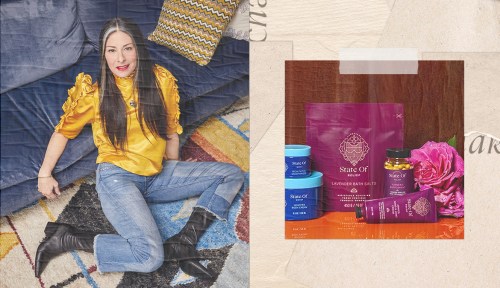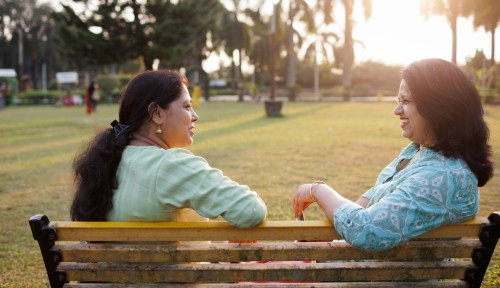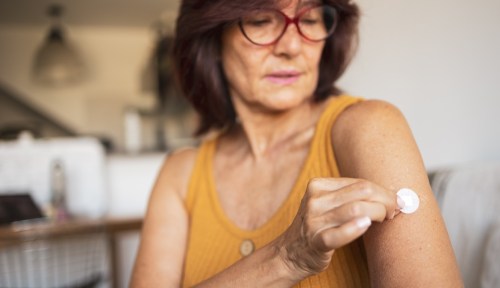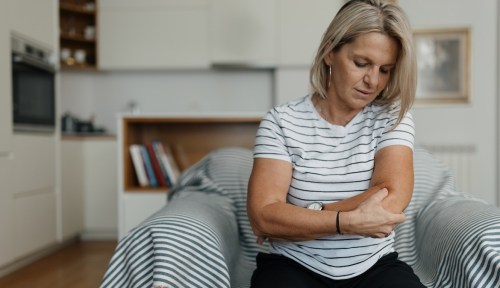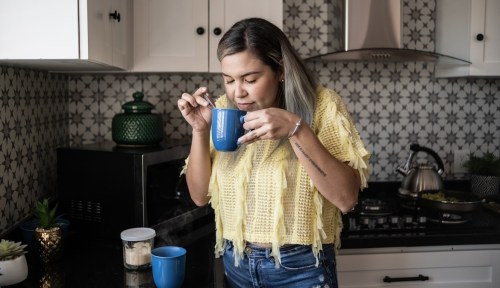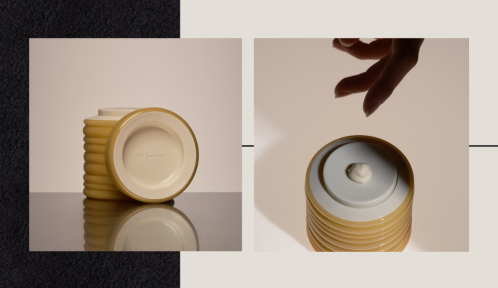Our editors independently select these products. Making a purchase through our links may earn Well+Good a commission
Consider the fact that every year, about 1.3 million people in the U.S. enter menopause—which carries with it 34 potential physical and mental health symptoms—and it’s easy to see why this once-ignored phase of life represents $600 billion worth of opportunity. But, if TV personality Stacy London, CEO of menopause-care company State of Menopause, hears those figures one more time, she tells me, she’s going to scream. To her, the far more interesting consideration is the “why” behind that blank space and the people who’ve been left underserved as a result of it.
Experts in This Article
Stacy London is one of America’s foremost style experts. She is best known as the co-host of TLC’s iconic show, “What Not to Wear.” Following that success, she hosted and executive produced 3 seasons of “Love Lust or Run.” Stacy has written two books, Dress Your Best, which was published to stellar reviews, and The Truth About Style, a New York Times bestseller. In 2020, she hosted a podcast discussing mental health, Could Be Better, tbh, in collaboration with the Crisis Text Line and The Jed Foundation (JED). In 2021, Stacy became the founder and CEO of State of Menopause, a holistic product line for women which addresses the symptoms associated with menopause and perimenopause. In this new phase of her career, Stacy is doing what she has done her entire career as a stylist: help people from suffering silently, raise their confidence and self-esteem by alleviating external symptoms, and removing the shame that surrounds them.
“Generationally, we’ve been taught to internalize shame about menopause,” London says, referencing the resulting dearth of information, products, or services catering to menopause up until this point. But now, there’s a confluence of forces pushing innovators like London, one of Well+Good’s 2022 Changemakers, to fill that gap. Up first is the fact that Gen-X is largely entering or in menopause at the moment, and “we, as a generation, do not take aging lying down,” says London. “We’re like, you’re going to tell me every person before me just white-knuckled this? Well, there’s no way I’m doing that,” she says, with a laugh.
What helps the cause is that technological advances across the health industry are allowing us to live longer—regularly, through and beyond menopause, for folks who menstruate—and consumer knowledge about health has grown by leaps and bounds, too. “We’re all more aware of how to take care of ourselves, physically and mentally, than we’ve ever been,” says London. “That’s creating longevity, such that menopause is really no longer the autumn stage of someone’s life.”
“Menopause is mother nature’s way of forcing us to refocus our energy on ourselves.” —Stacy London, CEO of State of Menopause
Instead, London sees menopause like a prolonged mercury retrograde: “It can feel like nothing is going right or like every circuit in your body and mind is shorting out,” she says. And as any astrologer will tell you ahead of a retrograde transit, you’ll be better off anticipating that and even embracing it by “slowing down to pause, relax, and receive,” says London. “That, to me, is what menopause is: It’s mother nature’s way of forcing us to refocus our energy on ourselves.”
To do that requires both education about and tools to handle this phase—all of which London has been working to provide with State of Menopause, since acquiring and formally launching the brand last year. Below, she and I chat about the evolution of the company and her vision for a future where menopause is as openly discussed and solved for as menstrual periods or pregnancy.
Well+Good: What initially inspired you to take over State of Menopause and launch it as your own brand?
Stacy London: It’s important to know that I had absolutely no interest in business at all before coming to this. But the reason I became so acquisition-minded is that I was a beta-tester for some of the products for what was initially going to be a menopausal skin-care line. And I felt real investment in a company that was already starting to think about menopause in 2018, mostly because I’d just started to become aware that what I was experiencing at the time was menopause through having to hunt for information.
I wasn’t getting the help I needed from doctors because I didn’t even know what to ask them, and my brain was doing gymnastics to try to explain what was happening to me. First, I assumed that recovering from spine surgery was the reason I felt anxious. Then, I got night sweats and depression, which I just assumed was the anxiety. And then, once my father got sick with heart disease, I started getting heart palpitations, skin rashes—I just thought it was the physical manifestation of grief. And when my doctor finally told me, “Oh, it’s just menopause,” I assumed I was overreacting.
I had antidepressants thrown at me. I had anti-anxiety medication thrown at me. But once I realized the role of hormones and menopause in all of my symptoms—the real one-two punch of experiencing menopause on both a physical and psychological level—I was like, it’s time to stop treating the problem and treat the person. I wanted the bigger context for what was happening, and there was none to be had. So for me, it was important not to sunset a line that had the potential to address some of this, but also to reconfigure it in the market. Menopausal skin care is part of it, sure, but I saw a much bigger play in terms of the acute symptomatic relief of menopause symptoms across the board.
W+G: Why did you feel that direct symptomatic relief was so important?
SL: Menopause happens at warp speed, and everything changes at once: Your taste changes, your feelings change, and hormones control all of that. So, I was like, “Why aren’t we talking about all of the things that we can do to optimize this time of life?” And that means creating products for symptoms, specifically, so that there are options. One person might say, “Hey, maybe I don’t need an estrogen patch, and I just need a cooling spray.” And another person just needs something for when they’re feeling muscle fatigue or breast tenderness. Well, great, our CBD oil is perfect for that.
Basically, I wanted to provide products for instantaneous relief—which is also why we’re going to be phasing out the supplements we launched with this year. It’s not that I don’t believe in supplements, but they put the onus on the consumer: You have to remember to take them every day, and medical professionals will tell you that you need to wait three months for any potential changes. Well, I don’t want you to have to wait three months to know if something of mine works; I want you to know within 30 minutes… or 20 minutes or two minutes, in some cases. So, when you’re bathed in sweat in the middle of a meeting and you’re making excuses or apologies, instead, you can be like, “I’ve got this,” and you can reach for something from your arsenal of tools.
W+G: So then, how will you address the menopause symptoms that can’t be treated instantaneously?
SL: Definitely, there are things that fall into that category, with weight gain being a big one of them. Where I see us going in terms of those things is partnerships with other companies where we can say, “Hey, are you doing an incredible program for menopause? Let us do that with you.” For example, we’re working with a nutrition company to help them create a program geared toward menopause and the specific weight-distribution changes it can bring. We’re also working with an exercise company that is creating a menopause-focused regime. But generally, if someone comes to us with something that falls outside our scope, we can at least point them in the right direction and educate them about it.
W+G: You’ve spoken a lot about the need for education about menopause. Why is that, and how are you working to provide that?
SL: People need to know upfront that there are options available for them to treat their symptoms because I didn’t know that at the time. And I don’t want anyone to go through what I went through. I had a crisis of confidence that really threw me off my game and broke my heart. But to have at least a little bit of knowledge about this phase of life beforehand would’ve changed the way I experienced it.
“We can offer products to help with menopause, but you can’t buy what you don’t understand. And you can’t make informed choices if you don’t have education.” —London
We can offer products to help with menopause, but you can’t buy what you don’t understand. And you can’t make informed choices if you don’t have education. That’s why, on our new website, you’ll find an option on the navigation bar called “Learn More,” and it has two sections. The first is “Menopause 101,” which includes articles on how to manage the more difficult aspects of menopause that were written by doctors or approved by our medical advisory team. And the second is our blog, “On Pause,” which includes archived newsletters from me, and for which we’re about to start allowing our customers to write first-person pieces—not product testimonials but essays about their experience with menopause.
Eventually, I’m interested in becoming a destination where people can interact the way that we now do on social platforms. We want our site to be a safe space for anyone going through menopause to connect. And that includes not only people within the chronological age group of 40 to 60, but also people going through medical menopause or surgical menopause or gender non-binary menopause at any point in life.
W+G: That’s awesome. What’s up next on the docket for State of Menopause?
SL: We knew that sex during menopause was the next thing we had to tackle. It is probably the number-one request I receive. So, we actually just launched a CBD suppository to help with vaginal moisture and painful sex, and we did that in partnership with a company called In Your Pleasure, who came to us and said, “Our biggest customer category is in menopause.” I was like, “Yes, we need to collaborate right now.”
We also have four more new products slated for this year, and some of those will also be collaborations because that’s also something I really believe in.
W+G: How do you see State of Menopause best serving that menopausal consumer in the future?
SL: Menopause companies have a lot to gain by working together. If we’re promoting each other’s companies, then we are really proving to our consumer that this is about her experience or their experience or whomever is experiencing this stage.
The fact is, menopause has so many distinct symptoms that we need to be thinking about the best way to tackle each of them—and no one company is going to be the winner on that. We need to be working together in order to say, “Hey, we do need our own aisle in the store. We do need our own shelf. We do need our own footprint.”
What I don’t want is for menopause to be this new thing that people invest in because nobody’s done it before, and then the fad fades. This needs to be part of the firmament. We need [menopause care] as much as we need tampons. And why is this something that we’re not talking about in the same way?
Oh hi! You look like someone who loves free workouts, discounts for cutting-edge wellness brands, and exclusive Well+Good content. Sign up for Well+, our online community of wellness insiders, and unlock your rewards instantly.
Sign Up for Our Daily Newsletter
Get all the latest in wellness, trends, food, fitness, beauty, and more delivered right to your inbox.
Got it, you've been added to our email list.
